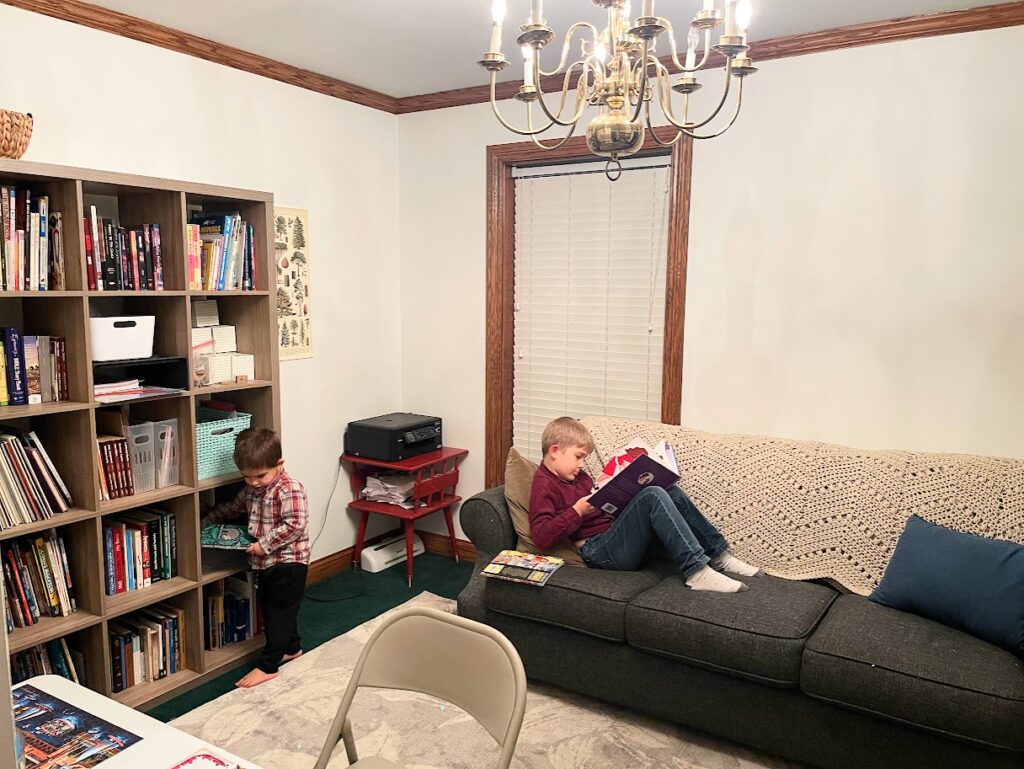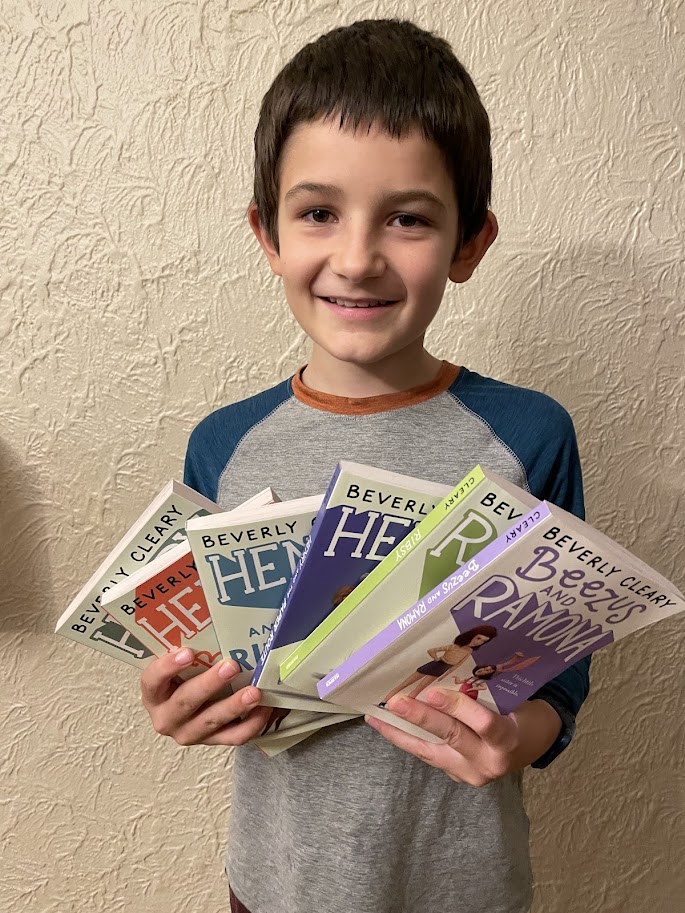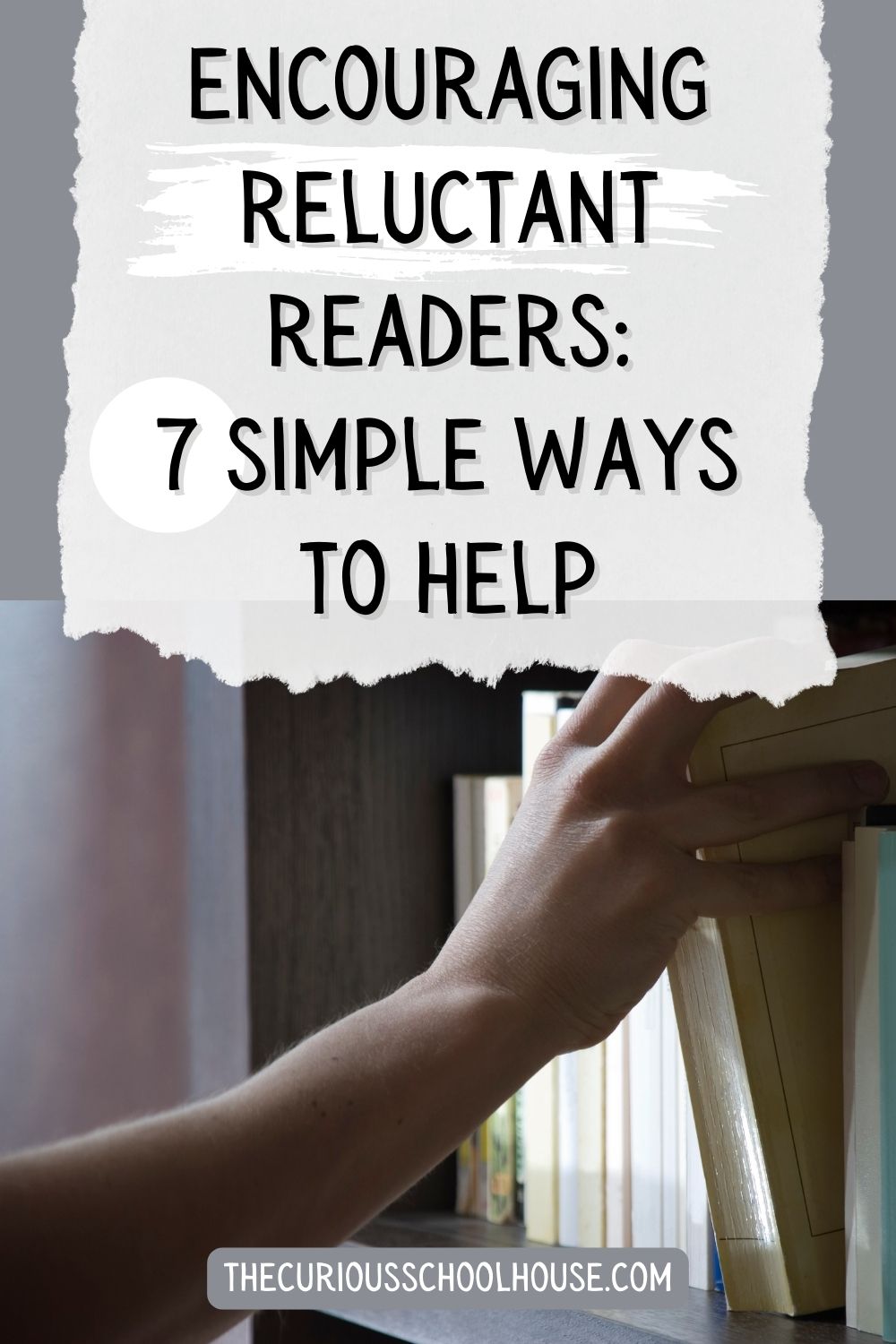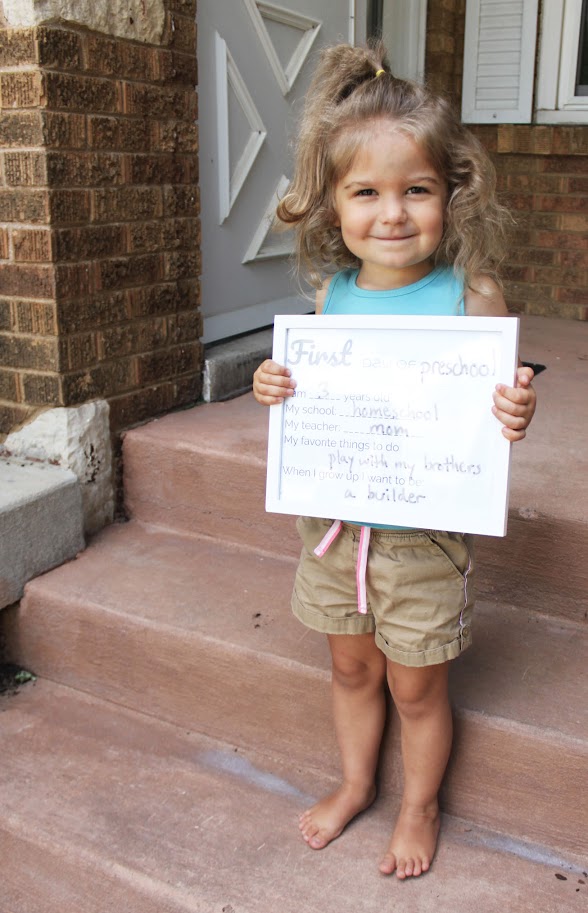Encouraging Reluctant Readers: 7 Simple Ways to Help
This post shares 7 simple ways to help children who don’t want to read; strategies for encouraging and motivating reluctant readers. I will also answer the question “What if my child doesn’t like being read to?” and share a personal story of how our second son finally fell in love with reading.
Parents already know that reading is important. We don’t have to be convinced of this! Homeschool parents, especially, know that great books and a love of reading are some of the most important keys to turning our children into life-long learners. However, the more we are convinced of this truth, the more discouraging it can be when our children simply don’t want to read.
We read out loud to them, we have fantastic non-fiction and fiction titles available for them to choose from, we limit their screen time so they’re not constantly distracted by video games, and still – they don’t want to read.
Have you had a child like this? Or, perhaps, children like this? Were you a child like this?
If so, I hope to offer you some encouragement, hope, and practical strategies that you can start trying out today in your home!
First of all, let me encourage you by making it clear that I have been there. In fact, in many ways I am still there. Out of our five children, only the two oldest are really in the habit of picking up a book during their free time. Part of the reason for this is of course that the two youngest (5 and 3) can’t read yet, and the middle child (8) is still not quite fluent enough to make reading on his own a pleasurable experience.
So, as you read these ideas for encouraging reluctant readers, know that I am using them in our home, right now! This post is for me as much as for you. I will not consider my job to be done in this area until all five children are strong, fluent readers who choose to read for pleasure in their free time; and yes, this might still be ten years away (or more!).

7 Simple Ways to Encourage Reluctant Readers
1. Be patient. I’ve received many messages from parents saying things like, “Help! My five/six/seven year old doesn’t like reading!” And yes, let me state again that I know from our own experience that this is truly discouraging. I get it, and I understand the frustration when you know that a child can read, but they don’t want to read. However – while I do not mean this to be condescending or dismissive of your concern – my first advice is truly, to be patient.
Even though your child can read, she might not be comfortable or fluent enough with it to enjoy the process. It’s easy to forget what a struggle it is when you first begin to read! Imagine trying to recall the sound of each letter, string it together with four or five other letters, decode the word, and then remember that word – hold it in your mind, along with the previous few – while decoding the next word!
Even once your child has moved beyond this beginning stage of just decoding the words, there is quite a range of fluency and ability. Imagine a scale where your level of comfort and ease with reading is a 10, and that child who is just sounding out CVC words is a 1; your reluctant reader still might only be at a 4 or 5. To truly enjoy reading and not to feel it is a chore, she might need to move up to a skill level of 7 or 8 – and often, that just takes time and maturity.
Let her read books that seem “too easy,” along with books that are right at her reading level. The easy books help to build stamina, which is so important for being able to read longer books! And please, try not to be worried or impatient, because your child will pick up on that, and that will do nothing to help encourage a love of reading.
2. Keep reading aloud. This is true whether your child is two, or ten, or fifteen! Reading aloud to our children does so much to improve their vocabulary, their comprehension, their understanding of grammar and sentence structure, and understanding of complex language; all of which will help them to become better independent readers!
Ask yourself: how will my child ever want to read a story on their own if they haven’t yet fallen in love with stories themselves?
Read to them, as many great books as you can, so that they come to understand – without a single lecture on your part – the immense joy of sharing a good story together.
3. Let them listen to audio books. Just like listening to Mom or Dad read aloud, listening to audio books conveys a world of benefits to our children, all of which help them immensely as they learn to become more fluent readers. Our favorite way to listen to audio books is with our Yoto player; all five kids can use it independently, even the three-year-old, and the quality of the books and music is fantastic! It’s the perfect activity for rest time, or when someone is sick, or while coloring or working on crafts. The more they listen, the more their minds are being filled with beautiful language, and that language has a power that cannot be overestimated.
4. Try many different styles of books (in many different ways). When I say “try,” I mean the following: try the first book in a series as a read aloud and see if your child likes it enough to keep reading the next book on their own; try it as a homeschool assignment (perhaps just a few pages for them to read each day) and see if they are “hooked;” try “strewing” certain books around the house and see if anyone picks them up; try reading it yourself while your children are around and see if anyone asks you what it is or why you’re reading it (do NOT tell them it’s a book for them; just casually mention something about it you like!).
We have done all these in an attempt to help our children find some books that speak to them. When it comes to styles of books, we have tried fiction, non-fiction, graphic novels, comic books, picture books, and book series – any of which can be a fabulous option!
However, I will say that I do not subscribe to the view that “it doesn’t matter what my child is reading, as long as they are reading.” I care deeply about what is filling their young hearts and minds, and I refuse to let them spend their precious childhood with books that are filled with potty language, disrespect toward adults, or irreverence towards God.
Furthermore, I think that books written in this style are disrespectful to children. The author (with good intentions, probably) is assuming that children cannot enjoy a book or fall in love with reading unless the book catches their attention with a questionable form of humor, and that is simply not true! Children are fully capable of appreciating the very best literature, if we will only give them a chance.
If you need more bookish inspiration, check out this post where I keep all of our book lists; you’ll find our top favorite books, in many different genres, and maybe something there will capture the interest of your child!
5. Cultivate a family culture of reading. This can be done in many ways. Here are a few of the ways we have tried to do this during different seasons of life:
- give books as gifts at birthdays and Christmas
- keep books in visible, easy-to-reach places
- let your kids see Mom and Dad reading (and talking about what we’ve read!)
- minimize screen time (for kids and adults too)
- make it easy for kids to read at bedtime (perhaps by giving them a reading light and their own basket of books near their bed)
- set aside time during the homeschool day just for fun (not assigned) reading – and make sure you participate too!
- host or attend a book club
6. Rule out any possible eye problems or neurological differences. It’s always a possibility that a child is struggling to get to a place of reading comfort because of eye problems, dyslexia, or some other physical issue. We have not had personal experience with these, but I know that they can present a host of challenges with reading, reading comprehension, and writing, so it’s well worth talking to a professional if you think this could be going on with your child.
7. Take them to the library. This helps your child in many ways: it introduces them to the vast possibilities of books to explore, it gives them some choice regarding what they read next, it normalizes library visits as something we do when we need inspiration or information, and it shows them that other people love books too! If you have a herd of small humans with you at all times, and library visits are a daunting prospect, check out this post with tips to make your library visit a success!

Bonus: What If My Child Doesn’t Like Being Read To?
I’m going to assume here that this is a young child, because that is the only experience we have had with this question; if you have an older (school age) child who doesn’t want you to read to them, my best guess would be that it’s either a matter of choosing the right books, or some sort of heart attitude that needs to be uncovered.
With a young baby, toddler, or preschooler, we need to remember that sitting and listening to a picture book is a learned skill. You will find a few children who naturally love this from the very beginning (our oldest was one), but most will not. This is good news, because it means that a) your wiggly toddler is very normal, and b) that he can learn this skill!
So, how can we help them to learn this skill? The answer is simply patience, consistency, and starting small.
I am continually amazed by the wonders that can be worked in our home simply by combining patience and consistency. Want your children to learn to put their piano books away on the shelf after practicing? Yes, this was a real thing we worked on last month. Remind them after every single practice session (consistency) and be patient (it may take longer than you think it should before it becomes a habit). Want your kids to remember to turn off the lights after they leave a room? Remind them every single time (consistency) and be patient. It really works!
When it comes to reading, if you sit down and read with your baby or toddler every single day (consistency), and simply be patient, they will eventually start to accept and even enjoy this time. If they are still struggling, then think about the concept of starting small, and make sure you’re not pushing for too much too soon. Can they sit and listen to just one page of a picture book? If so, that’s fantastic – and maybe next time you can try two pages. If they can’t listen to one page, can they at least look at the pictures on one page while you ask them what they see?
There is a balance to strike here between challenging your child to sit and concentrate just a *bit* more than what is comfortable, while also being aware of their undeveloped attention span and not pushing so much that the experience is miserable for everyone.
Our Second Son: A Story in Patience and Persistence
To encourage you in your own patience and perseverance, let me tell you that our second son never, I repeat, NEVER chose to sit down and read a book for the first ten years of his life. He had known how to read (quite well!) since he was six, but simply didn’t want to. We did all the things I shared above: read to him constantly, gave him books, tried many different series and comic books and non-fiction books, let him listen to audio books… and we waited.
I can’t deny that I was a little concerned (especially after our oldest son, a natural book-lover who would read all day if we let him), but I was comforted by two promising signs: firstly, that he did know how to read quite well, and secondly, that he loved our read-aloud times.
So, we waited, and kept trying, and finally, right around his tenth birthday, we struck gold with this fantastic series by Beverly Cleary. Dad read the first book out loud to the boys at bedtime, and Son #2 WAS HOOKED. We checked out more of the Henry Huggins books from the library, ordered a few off Amazon, and he read them as fast as we could find them. I was thrilled!

He has since re-read several of them, and I also find him sitting down with other books more often, and reading for fun during his spare time. It still shocks me every time I see him sitting down with a book!
What flipped the switch for him? We may never know for sure, but I think it was a combination of finally finding the right book (an interesting, funny, NOT TOO LONG chapter book about a boy like him) and also his increased maturity and comfort with reading – which could only come with time and patience.
Conclusion
We are still working on these things, and I do not have – and never will have – all the answers. I will probably be encouraging reluctant readers in our home for many more years to come! However, we’ve seen great progress and many small joyful successes that tell me it is worth the effort.
Our children are worth the effort, and reading is worth the effort!
Do you have any tips that I missed? How have you helped your children to grow in their love for reading? Let us know in the comments!








Love this! Right there with one of mine and these are the reminders I needed!
Great tips! As a homeschool mom of 5 myself, I really appreciate these tips. Getting these kiddos to read is not easy sometimes. Thank you
Loved all your tips! Our middle son was not a fan of reading- but he loved fishing! We ordered him fishing magazines & that encouraged him to read & learn!😁
That’s a great idea!
These are great and practical tips to put into place. Thank you for sharing them.
I still love going to the library:)
Great read! I’m going back to read more of your recommended book lists!